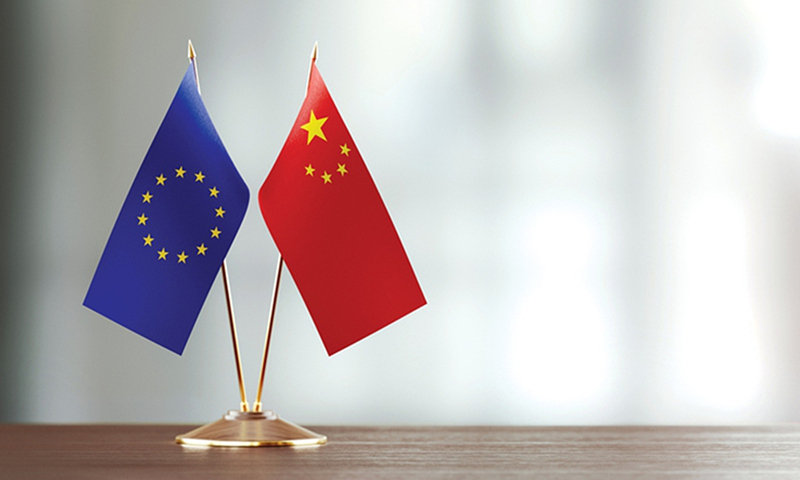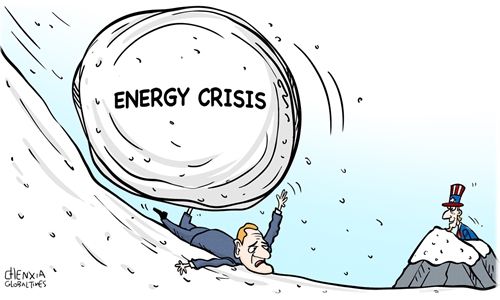China is akin to a fitness club for European companies that drives us to be faster, better: president of the EU Chamber of Commerce

China-EU Photo: VCG
Editor's Note:
Europe needs China to prosper, and China is akin to a fitness club that forces European companies to be "a little bit faster, a little bit better," Jörg Wuttke, president of the EU Chamber of Commerce in China, told Global Times reporters Li Aixin and Bai Yunyi in an exclusive interview during the Sixth Taihe Civilizations Forum. Ties between China and the EU have been rocky over the past few years, with voices in Europe calling for decoupling with China also on the rise. Will such decoupling occur? Is China-EU cooperation still possible? Wuttke shared his insights on these issues and a wider range of topics.
GT: You said in an interview not long ago that China needs Europe "more than ever." In your opinion, does Europe also need China?
Wuttke: Definitely. We need China to win and prosper as China is a huge possibility as a market for us.
This is not just in terms of trade or investment. We published two papers last May to highlight this. One focused on carbon neutrality. In order to fight climate change we cannot leave out China. So, I have been very vocal about the fact that in terms of carbon neutrality, equipment, software and processes, we have to engage even more.
The same also applies for cooperation in research and development. A second paper that we came up with in May outlined the difficulties of doing research in China, but also the near endless development opportunities, where China has an incredible demanding customer base and competitive companies that have forced Europeans to be a little bit faster, a little bit better.
When it comes to development, China is akin to a fitness club for us. You can see it in the chemical industry or in the automotive industry, where it helps us to expose ourselves to a vast base of very demanding Chinese customers, who in most cases are not very brand loyal. In Germany, my grandfather bought a Mercedes, my father bought a Mercedes, so I'm going to buy a Mercedes. But in China, customers do not want to have these ordinary cars anymore. They want to have a computer on wheels. It's good for us to learn these.
Of course, China needs Europe as well, particularly now, as consumption is low in China. Exports from China grew by 20 percent in the first half of 2022, whereas imports from Europe went down by 10 percent. Chinese businesses are happy and lucky to have so many European customers.
GT: Has the Uyghur Forced Labor Prevention Act, implemented by the US, affected the operations of European companies in China?
Wuttke: I'm not aware of such yet, so I cannot put a dollar sign or euro sign on this. I think most companies had already reallocated their supply chains, with some were criticized for it. For example, H&M, adidas and Nike were heavily criticized for withdrawing their sourcing from Xinjiang. But what choices do they have in such circumstances?
I think that there are very few European companies engaged in non-critical items, such as cars and chemicals, where you are not subject to these sanctions, because you frankly don't export these items. But certainly, it might be challenging for solar panels. But the US has put up an incredible barrier for exports from Xinjiang, and I'm sure that US importers, as well as Chinese exporters, are going to suffer.
I haven't seen much impact in Europe. What may happen is that public opinion in Europe might follow this and say: so why don't we have such an act in order to prevent exports from Xinjiang too?
That's why we, at the European Chamber, ask the Chinese government to make it possible for us Europeans operating in Xinjiang to have third-party, internationally known auditors. We believe we can prove that we are not using forced labor. I think we can show that our business partners don't use forced labor, but we need third-party accreditation to formally demonstrate this to customers in Europe or the US, and to their governments.
GT: Do you think there is still hope for rebooting the China-EU Comprehensive Agreement on Investment in the future?
Wuttke: The Chamber and the Commission worked very hard for seven years in order to get this going. In spite of huge US pressure in December 2020, the deal was concluded. We were very proud to have something which I think mutually benefited Chinese business as well as European business. But then the sanctions came in relation to Xinjiang, and China responded with severe counter sanctions as well. I see very little hope that the sanctions can be lifted.
In the Bible, you can have several bad years and then several good years. So maybe we have to wait several years and then the good years will come.
GT: The Russia-Ukraine conflict has had a certain negative impact on China-EU relations. Where do you think the impact is headed? Do you think it will slowly subside in the future?
Wuttke: It will be an open wound in the relationship between the EU and China in a way. Can it be patched up? I don't know. At this stage, we have to step back a little bit.
We have dark spots on the picture of ties between Europe and China. We have to step back and see how many positive, colorful dots we can put on the canvas and on the relationship. We can't solve the dark dots. It's the way it is - we have different systems, different political outlooks. But we have to find topics which we all believe in - carbon neutrality, research & development, biodiversity, and then see how we can boost those.
The other black dots don't look as dominant. We have to accept them, but we don't have to dwell on them. I guess my purpose at the Chamber is trying to find the colorful things that actually showcase that our relationship is complex but has very positive aspects.
I'm optimistic about China-EU cooperation in the sense that I still believe that in China, as well as in Europe, there are enough people interested in finding these bright spots and positive topics.
But again, it is important that we do not let the relationship be sidetracked by more negative topics. We need to stop lecturing and stop poking each other in the eye. We are different. As European policy says, we are partners, competitors, and rivals, so be it. But we have to see where we emphasize it.
GT: Protests are emerging in European countries due to the energy crisis. Surveys are suggesting the cost-of-living crisis may cause social unrest. According to your knowledge, is there a way out of the current European energy crisis?
Wuttke: Honesty, I don't see any social unrest. Prices are very high and people are very unhappy about it. Driving cars will be more expensive, heating houses will be more expensive, and inflation has been mind-blowing. But I think people will accommodate this, and they will tighten their belts and put on more clothing during winter.
We were very worried about two months ago about the gas supply into Europe, and that we would have a really cold winter. But Europe's gas storage tanks are now filled up to 87 percent, above target. It looks much better than it looked eight weeks ago. That's very encouraging. People know how to respond to a crisis. It's an open society where you can voice your displeasure. But everybody knows where it comes from - the war.
People will just have to see how they can get themselves through it. The crisis has a positive side effect that people will be forced to actually de-carbonize their life more. And there will be more solar and wind power, which will benefit Chinese industry, because that's where you are a world champion. There will be more new technologies coming. Chemical processes will change from gas to electricity. There will be more options, and I think then eventually we will look back and say it was very painful, but it was worth it.

